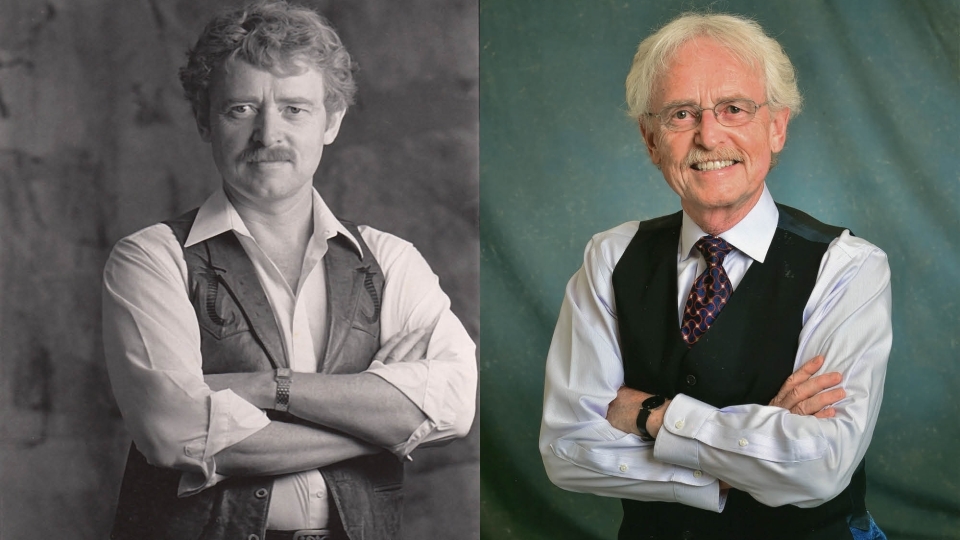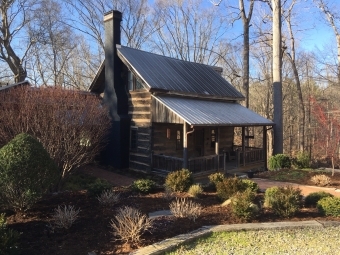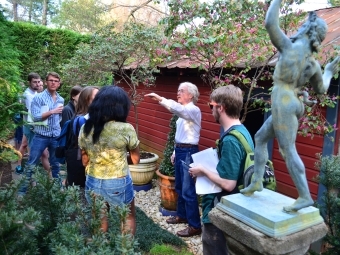Larry L.R. Ligo Retires After 50 Years of Teaching Students the Beautiful Intersection of Art and Travel
May 4, 2020
- Author
- Jen McGivney

Retiring after five decades of sharing the wonder of art with students at Davidson College, Larry L.R. Ligo says he’ll remain a perpetual student of art.
Students who travel with art history professor Larry L.R. Ligo soon discover this: He walks quickly.
Whether wandering Paris or Vienna or London, whether exploring museums or architecture or gardens, students on his international trips learn to keep up with his pace.
The pace isn’t much different in his classroom. When he came to Davidson College for his first teaching job, he expected to stay a year or two. Fifty years later, he’s still here. What has kept him here all that time are the students who keep up with a pace of teaching that rivals his pace of walking.
“That's what's so much fun about teaching at Davidson,” Ligo says. “You can teach graduate level courses and the students don't know it. You can push them beyond what most undergraduate-level students are able to do, and they do it.”
This spring, Ligo will retire from Davidson after five decades of teaching. During that time, he not only introduced the art history major to the college, but he spent each year showing students how relevant art history can be to any era and to any place. He jokes that no student should be able to get a passport until they take a course in art history, but everything else he says gives the distinct impression that he’s not really joking.
“Some students say, ‘I can see these paintings right here, why would I go all that way to see images that I grew up with?’ Then I watch them for the first time in a museum, hovering about two feet off the ground when they see an original as opposed to a reproduction,” he says. “They see that it’s actually the piece that Leonardo or whoever actually touched. It can't be put into words how excited they get and how important that moment is.”
Ligo’s love of art comes with an energetic enthusiasm, one that has convinced many students to change their major to art history after they enter his classroom. When students’ parents have concerns that the major isn’t practical, he’s reassured them that his students have pursued all kinds of careers, including more than a few art history majors who went on to medical school.
“The people who produced art didn’t do so in a vacuum. They lived in their societies, so you have to know what they believed in,” Ligo says. “You can’t study art history without studying religion. You can’t do it without studying politics, without sociology or psychology. That’s what’s fun about art history … It helps you become a multidimensional person.”
Immersive Experiences
When Sunny Coady visited her niece Hannah Blunt ’06 at Davidson for the first time, she requested the grand tour. Coady wanted to see the campus, explore the town, meet her friends. But first, Blunt insisted, her aunt had to meet her favorite professor, Dr. Ligo.
Coady is an art lover herself who majored in art in college. She clicked with Ligo as easily as her niece did. Soon, Coady joined a group of people who believed that students shouldn’t be the only ones lucky enough to study abroad with the professor. As a side venture, Ligo began to host international tours for alumni and relatives who envied the students’ experiences. These were no casual vacations; attendees had required reading lists and kept up with busy schedules.
“He’d always give us a book about where we were going, and he’d lecture us on the bus as we were on on our way to a museum or a garden,” Coady says. “These were the places I’d studied and always wanted to see.”
The students’ trips were even more intense. Blunt recalls a senior seminar Art History Capstone class trip with Ligo. Each of the nine students had spent the semester studying a particular cathedral. Then during a spring week in Paris, each student presented a formal, 45-minute talk to the class while inside their chosen cathedral, amid throngs of tourists and professional guides. The assignment seemed more advanced than what a 21-year-old student could do, she said, but they all did it successfully.
“[Dr. Ligo] has this attitude of can-do positivity,” Hannah says. “I have carried that with me to this day. I’ve had many moments in my careers of hitting a wall, thinking that I can’t go on. And I remember his attitude, to believe in myself and to push through, and that I will do this, too.”
Drive to Create
Ligo’s many and varied interests—19th century art, architecture, theatre, music, photography, garden art history and Edouard Manet, on whom Ligo published a 950-page text that remains in print—fuel his drive to do and to create. That drive is a throughline, uniting Ligo’s passions.
Early in his career at Davidson, spurred by a deep interest in architectural history, Ligo scoured the region for log structures. He did so first as an interested observer, but then grew inspired to build his own log home.
Locals alerted Ligo to an old log building on a dairy farm in the Mt. Ulla area. The farmers used the structure for storage. But under clapboard siding, Ligo discovered a finely crafted red oak home, circa 1802-3, with pent roofs, hand-shaped beams with decorative borders, wide-board floors, and hand shaped rafters.
Ligo designed an architectural history class that incorporated the log house. Students signed on and embraced the project, which included moving and reconstructing the home on property near the college. They learned about craftsmanship and professional restoration techniques in the process.

Built in German style near Mt. Ulla, N.C., when Thomas Jefferson was president of the United States, Larry Ligo’s students helped to move and reconstruct the log house for credit as part of a seminar on Architectural Restoration. Ligo lived in the cabin from 1975 to 1984.
Ligo also created and led the first art history semester study abroad programs at Davidson, first in France and then in the United Kingdom. The students who participated majored in a wide variety of fields.
“All art courses were studied from original works of art; there were no slides in a dark room,” Ligo says. “If we were studying Chartres Cathedral, we were in Chartres Cathedral; if we were studying Claude Monet, we were in Giverny or the Louvre; If we were studying Rodin, we were in the Rodin Museum.”
He also conceived, initiated funding efforts for and led the first and many consecutive art history capstone trips for senior majors.
These trips, Ligo says, were the most exciting of his efforts to bring his students to the art—after standing in Durham Cathedral, Tate Gallery, the Louvre or the Musee D’Orsay, or on the rocks of Mont St. Michel, students returned profoundly affected and Ligo returned to the classroom energized.
That energy propelled Ligo through five decades of teaching. To the very last class, Ligo fine-tuned and recrafted his courses to address new developments across disciplines and new insights. Inspired by Hilma af Klint’s radically abstract paintings, Ligo rewrote his European Painting and Sculpture class following a 2018 encounter with her work at the Guggenheim Museum in New York City.
It’s not just the students who hover two feet off the ground.
Lifelong Impact
Ligo is a study in momentum. Walking quickly, teaching quickly, encouraging all to keep up with his pace. How will he slow down in retirement?
He won’t.
His retirement won’t look much different from his work, which may be the biggest compliment one can pay their career. Ligo and spouse, Gardner Roller Ligo, have trips they look forward to taking with their children—more art to see, new places to explore. They’re 20 years into a 100-year garden project in their back yard. He’ll remain a perpetual student of art.
Talking about retirement doesn’t slow his pace of conversation one bit. Only one topic slows him down: It’s about a box of letters he keeps in his home. The letters are from former students, some recent graduates, and others who were in his classroom decades ago. When they travel to see art now, many former students still write to him to share how his class affected—or even compelled—their trips. Many still bring their old Ligo class notes with them.
“The most lucrative thing I’ve received from teaching are the letters from students I had years ago, who’ve gone to Paris or Italy and think enough of the class they took from me to write a letter about it,” Ligo says. “Money doesn’t come close to paying that.”

Prof. Ligo teaching students in his back yard garden.
As a tribute to Ligo, Davidson College is creating the Dr. Larry L.R. Ligo Art History Travel Fund. The fund, launched by Martha and John Scandling ’74 and Ginny Newell ’78, allows future students who have an interest in visual art to pursue the travel that Ligo encourages, to hover two feet off the ground in front of an original masterpiece. The Scandlings and Newell established the fund to honor Ligo and to inspire others to do so. If you’d like to contribute to the Dr. Larry L.R. Ligo Art History Travel Fund, please visit davidson.edu/makeagift, select “other,” and type “Ligo Travel Fund” as the designation name.
Give to the Larry L.R. Ligo Art History Travel Fund



